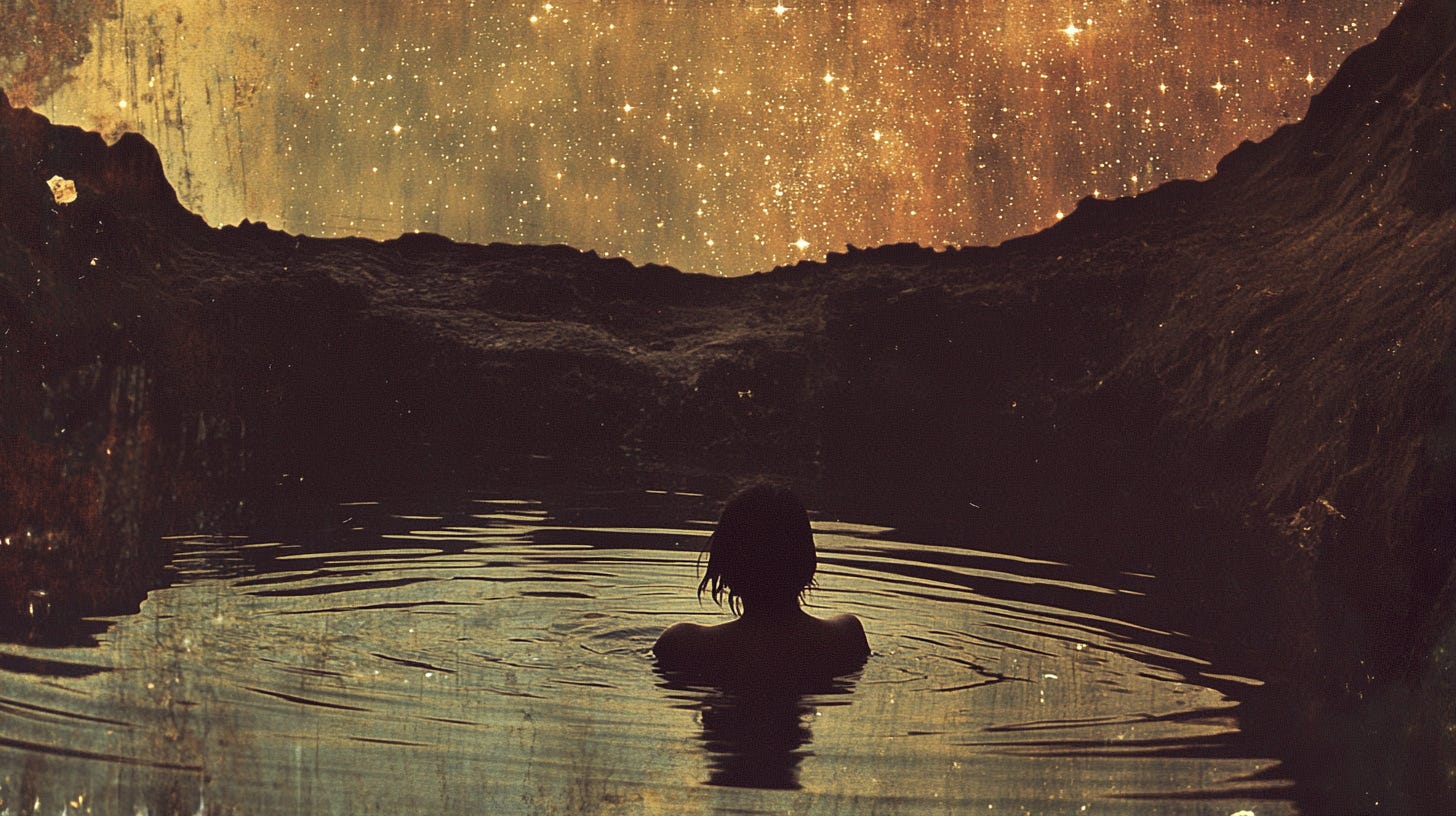Starborne: The Journal of Autocosmology, Issue 1, can be read in full at the above link. Each individual contribution will be shared here as well, one every week.
A Song from the Woods
By Morda Kennedy
I am standing naked on the edge of an abandoned rock quarry in Abingdon, Virginia. I am 19 and a Summer Apprentice at the Barter Theatre. It is my first time doing any psychedelic, and I am coming up on two hits of acid. I am about to go skinny-dipping for the first time as well—there is water in the bottom of the bowl-shaped quarry, though it is too dark to see it. It is a warm night, and the air feels good on my bare skin. I step back from the edge to get a running start and leap into the quarry. With a concussive thud, I hit the side of the deep pit and tumble down the dirt embankment for what seems like a very long time. I am Alice down the rabbit hole. I’m falling end over end and briefly think, “This is how I die. I will break my neck and die here.” I’m not upset by this, just surprised. I hit the water with a huge splash. It is cool. It envelops me. I come up for air and start swimming. Liquid silver slithers over my body. The night sky is reflected in the pool—as above, so below. I am mesmerized. I hear a splash behind me. Oh yeah...I am with a guy, a local. I don’t remember his name. He sold me the acid. He swims up to me, his face is contorted: “I thought you were dead! Oh my god, you fell down that slope, you gotta jump OUT—a lot farther—to clear the sides of the quarry. I thought you were dead!” I am past that now, and he is boring me. I backstroke across the water while he continues muttering about me being dead. I stop and float—looking up at the stars and also IN the stars. I am swept into the vastness of the Universe—held deep in the earth, in this liquid womb, and feeling part of the heavens and all that is. I sink into the expanse of this moment and never want it to end.
“I’m freezing. Let’s get out of here.” The drug dealer. I forgot about him again. How could he be cold? This night is perfect! He drove though so I follow him to the quarry’s edge, looking for stairs or a ladder. “This is the best place to climb out, lots of roots and rocks.” In a moment of complete sobriety, I realize we have to climb over twenty feet to get out. I have muscular dystrophy—40% nerve capacity in my hands and feet, and my ankles are fused! He is halfway up the wall face. “Just follow me.” I can’t see well enough in the dark to do that, but I start grabbing at rocks and tree roots that are sticking out from the wall, and I climb. The quarry wall is slick with dirt and loose rock. Somehow, I reach the top, grab a clump of grass, and haul myself over the edge. I am scraped to hell, covered in mud, and triumphant! I clawed my way out from the belly of the earth.
Later, after I return to my dorm, shower, and put on fresh clothes, I take a pillow, blanket, and my Sony cassette Walkman out to the greenspace next to the rehearsal hall. I lie down beneath a giant green ash tree. I look up. The leaves look like the lace on my grandmother’s holiday tablecloth. I nestle under this delicately fractaled canopy and push play to hear Jethro Tull’s Songs from the Wood. I rewind the tape and replay the song over and over. I feel a sense of belonging that I have never felt before. I am part of the Universe, and it is part of me. I know, for the first time, that I am okay...I am okay. This simple statement was never available to me before. I am okay. I am competent, and smart, and there is nothing wrong with me. My heart expands. I want others to feel this, to know this. I want others to try acid and know they are beautiful. I want to heal the world through psychedelics. But first, I want to lie under this tree in this perfect moment and listen to Ian Anderson’s killer flute solo again.
Morda Kennedy is a spiritual coach, performance artist, and scholar who creates original performance work inspired by dreams and fairy tales and grounded in deep spiritual exploration. She is currently a PhD student in East-West Psychology at CIIS. Her current research focuses on how role-playing games (namely classic Dungeons & Dragons and the computer game, Baldur’s Gate 3) can support people in reframing personal narrative, particularly as this relates to spirituality and chronic illness.





